|
|
|
Sort Order |
|
|
|
Items / Page
|
|
|
|
|
|
|
| Srl | Item |
| 1 |
ID:
180641
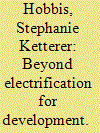

|
|
|
|
|
| Summary/Abstract |
Based on an in-depth examination of the acquisition, use, maintenance and deterioration of solar home systems in a village in Malaita, Solomon Islands, this article challenges the analytical focus of current debates on electrification in Pacific Island countries – why Pacific Island countries have not yet sufficiently electrified to achieve their development goals. Alternatively it examines what is, how, in this case, rural Solomon Islanders have integrated already available electricity into their daily lives. This perspectival shift highlights how rural Solomon Islanders have developed an energy identity that corresponds to their needs, interests and values, rather than those of national and international actors. It re-emphasises the struggles of national and international electrification initiatives in rural environments, linking them to a broader distrust in the motivations of external actors. At the same time, it reveals how, throughout their life cycle, rural solar home systems have become integrated into processes of social reproduction rather than development aspirations. Contrary to dominant debates, rural solar home systems matter most in the opportunities that they provide for reciprocal exchange than for what the electricity enables them to do.
|
|
|
|
|
|
|
|
|
|
|
|
|
|
|
|
| 2 |
ID:
175364
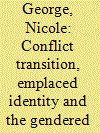

|
|
|
|
|
| Summary/Abstract |
Although there is growing recognition that women’s participation is critical for the durability of peaceful conflict transition, grounded research examining the political scale of women’s participation has not been common. Where feminist researchers have tackled this topic, they have generally reproduced binary representations of political space, sometimes strongly critical of local spaces as restrictive of women, sometimes strongly critical of a hegemonic liberal international. In this article, I address the issue of women’s participation in conflict transition governance from another more ethnographic angle, drawing from fieldwork conducted in the Solomon Islands, a Pacific Islands country destabilised by conflict in the late 1990s and early 2000s. I apply theories of political scale to consider where and how women are politically active in the conflict transition environment, how that political activity is constituted relative to other political scales and where and how women seek to make their political ambitions understood. The ‘emplacement’ lens I develop offers a critical vantage point for analysis of the ways women constitute political identities and the agendas they might meaningfully progress, at scales ranging from the small worlds of the household and the community to the broader scale of national politics.
|
|
|
|
|
|
|
|
|
|
|
|
|
|
|
|
| 3 |
ID:
058969
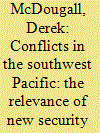

|
|
|
|
|
| Publication |
Aug 2004.
|
| Summary/Abstract |
In recent years the two major conflicts affecting the island countries of the Southwest Pacific have been in Bougainville and Solomon Islands. After reviewing the ways in which these conflicts have developed, this article asks whether any of the new perspectives in security studies are relevant to these situations. The broadening in scope suggested by terms such as 'comprehensive security' and 'human security' is helpful in this respect. Some of the insights from more particular approaches such as the 'new wars' thesis and the literature relating to the role of economic factors in civil wars are useful. The concept of state failure is helpful for understanding the situation that has developed in Solomon Islands. Some of the issues in the broader discussion about international intervention have a bearing on both Bougainville and Solomon Islands.
|
|
|
|
|
|
|
|
|
|
|
|
|
|
|
|
| 4 |
ID:
138957
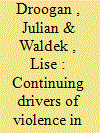

|
|
|
|
|
| Summary/Abstract |
The Regional Assistance Mission to Solomon Islands (RAMSI) has provided a relative decline of violence in Honiara for over a decade. However, the combination of customary cultural practices utilised in negotiating status and power in Solomon Islands society with ongoing demographic and economic processes exacerbated by the period of foreign intervention has perpetuated underlying drivers of violence that are likely to reignite once RAMSI fully departs. The use of practices of social reciprocity and compensation in order to gain and effectively wield key resources such as cash, access to jobs and access to land is ongoing in Honiara, where new opportunities provide new pathways to utilising these practices by growing cohorts of youth. This article examines the use of these forms of negotiation in Honiara and argues that three ongoing processes are likely to drive future outbreaks of violence in the capital once RAMSI departs: a rapidly expanding urba; ongoing contestation over access to land; and the effects of international investment and presence of urban foreign enclaves.
|
|
|
|
|
|
|
|
|
|
|
|
|
|
|
|
| 5 |
ID:
102683
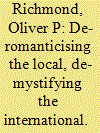

|
|
|
|
|
| Publication |
2011.
|
| Summary/Abstract |
Many actors involved in peacebuilding and statebuilding are acutely aware of the different roles of the 'local' in peacebuilding. Increasingly, this realisation has opened up tensions between the liberal peace and the realm of customary forms of politics and social structure. Peacebuilding may now be seen as a site of international assistance and local acquiescence, co-option or resistance. To understand these dynamics, the 'infrapolitics of peacebuilding' need to be uncovered. This article presents these dynamics in the cases of Timor Leste and the Solomon islands.
|
|
|
|
|
|
|
|
|
|
|
|
|
|
|
|
| 6 |
ID:
153266
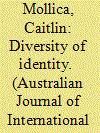

|
|
|
|
|
| Summary/Abstract |
In recent years, the transitional justice field has become increasingly concerned with ensuring meaningful participation from a wide range of actors. In response, a burgeoning scholarship has emerged, which aims to understand the interests and needs of these stakeholders, most notably women and children. Noticeably absent from this research is an examination of youth interests as distinct from children’s. Instead, the conflict identities of youth are most often conceived as inextricably tied to those of children. As a result, the narrow victim/perpetrator binary remains the dominant identity construction employed for understanding their involvement in conflict and transitional justice processes. Drawing on the case of the Solomon Islands Truth and Reconciliation Commission, this article reveals that youth are more than passive subjects in the reconciliation process. It demonstrates that the interactions of youth with truth and reconciliation commission processes allow youth to exercise agency, and thus challenge the dominance of the victim/perpetrator identity construct. The article thus proposes an alternative way of framing youth participation, whereby the identities of youth in transitional contexts are represented as diverse and malleable.
|
|
|
|
|
|
|
|
|
|
|
|
|
|
|
|
| 7 |
ID:
120210
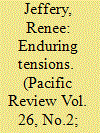

|
|
|
|
|
| Publication |
2013.
|
| Summary/Abstract |
From 1998 to 2003, the Solomon Islands found itself in the grip of 'the Tensions', a violent civil conflict that left some 200 people dead, more than 20,000 displaced, and countless others subjected to torture, rape, fear and intimidation. In the aftermath of the conflict, two dominant approaches to post-conflict justice emerged. The first, implemented by the Regional Assistance Mission to the Solomon Islands (RAMSI), favoured a 'rule of law' approach according to which large numbers of militants on both sides were arrested and processed through the criminal justice system resulting, in many cases, in the imposition of lengthy period of imprisonment. The second, 'reconciliation' approach, favoured local, grassroots, traditional and indigenous justice processes and were routinely implements by community groups, women's organisations and the churches. This article demonstrates that in the absence of a formally planned transitional justice process, these two approaches to post-conflict justice have come into serious tension with proponents of each accusing the other of hampering their justice efforts. It examines those tensions and analyses the extent to which the Solomon Islands' Truth and Reconciliation Commission, designed in part to provide a bridge between the rule of law and reconciliation approaches, has been able to quell this new set of tensions.
|
|
|
|
|
|
|
|
|
|
|
|
|
|
|
|
| 8 |
ID:
175057
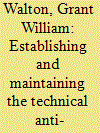

|
|
|
|
|
| Summary/Abstract |
Scholars have sought to explain how and why developing countries establish anti-corruption agencies by examining the strength of national and international institutions, particularly political institutions and actors, international donors and civil society. This article argues that these explanations are inadequate and that explaining the nature of anti-corruption reform in developing countries requires accounting for the transnational technical anti-corruption assemblage. This assemblage comprises individuals, ideas and things that reinforce technical solutions to corruption. This article examines the case of anti-corruption reforms in Solomon Islands during and after the international Regional Assistant Mission to Solomon Islands (RAMSI) intervention (2003–2017). It shows that parliamentarians passed anti-corruption reforms despite declining pressure from donors, relatively weak civil society and wavering political commitment. The article suggests a transnational coalition of national and international actors and objects helped establish and maintain a technical anti-corruption assemblage. Through exclusionary practices, this assemblage helped maintain the technical and apolitical nature of anti-corruption reform. Findings provide insights into the effectiveness of anti-corruption ‘policy transfer’ in Solomon Islands and other developing countries.
|
|
|
|
|
|
|
|
|
|
|
|
|
|
|
|
| 9 |
ID:
073364


|
|
|
|
|
| Publication |
2006.
|
| Summary/Abstract |
In April 2006, rioting broke out in Honiara, Solomon Islands, following the parliamentary election of Snyder Rini. Occurring almost three years after the commencement of the Australian-led Regional Assistance Mission to Solomon Islands (RAMSI), the riots sparked intense deliberations about the nature of Australia's engagement with Solomon Islands and the success, or otherwise, of RAMSI. Within the context of discussions about state-building in Melanesia, this article seeks to outline challenges to the success of RAMSI. Ultimately, we argue that successful state-building in Melanesia is highly dependent upon awareness of local conditions, rather than simply the application of international best practice. Moreover, we suggest that unless the current approach is modified to accommodate local circumstances-including social and political structures and locally defined needs and desires-the existing growth of anti-RAMSI sentiment will continue to escalate. In conclusion, we offer policy-relevant suggestions aimed at assisting mission stakeholders to improve RAMSI's viability and impact.
|
|
|
|
|
|
|
|
|
|
|
|
|
|
|
|
| 10 |
ID:
197384


|
|
|
|
|
| Summary/Abstract |
Across the Pacific, socio-cultural networks are a key way to share knowledge and skills. However, as peer-to-peer learning is contextually and culturally located, it is important to understand the place-based specifics of such learning. This article draws on the evaluation of a series of household-based workshops on agricultural development and food security in a remote area of Solomon Islands. It outlines this community's kinship ecology for farmer learning pathways and demonstrates the interdependence of gender and kinship-based social networks, showing how topics related to ethics of living were shared within clans, while food and agriculture topics were shared within households. The article concludes that understanding local knowledge networks can contribute to the design of more effective peer learning for food security and rural development.
|
|
|
|
|
|
|
|
|
|
|
|
|
|
|
|
| 11 |
ID:
117142
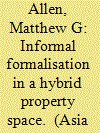

|
|
|
|
|
| Publication |
2012.
|
| Summary/Abstract |
Across post-colonial Melanesia, the benefits and costs of 'mobilisation' of customary land for economic development remain much debated among scholars, activists, policy-makers and the donor community. This paper presents a case study from Solomon Islands of a hybrid property space in which smallholder oil palm blocks are being established on customary land through an informal 'smallholder land use approval' system. This system provides salutary evidence of how customary land can be engaged for commercial agricultural activity without recourse to formalisation. It also potentially provides a more equitable pathway for landowners, especially women and young men, to engage in the oil palm sector, with the only current alternative being the registration and leasing of land directly to the oil palm company. However, enthusiasm for the scheme must be tempered by an explicit awareness of the relationships between land, development and conflict on the island Guadalcanal where the oil palm operation is located. The nascent 'informal formalisation' and commercialisation of customary land that is taking place on Guadalcanal is subjected to a conflict analysis informed by both the recent history of violent conflict in the area and comparative experience from the village oil palm sector in neighbouring Papua New Guinea. A number of potential conflict stresses are identified and recommendations made to mitigate them.
|
|
|
|
|
|
|
|
|
|
|
|
|
|
|
|
| 12 |
ID:
143535
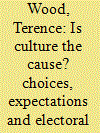

|
|
|
|
|
| Summary/Abstract |
Research on Solomon Islands and Papua New Guinea typically offers one of two explanations for the choices voters make, and the way these choices contribute to those countries’ poor political governance. The first explanation focuses on culture’s influence on the expectations that voters hold of politicians, contending that the Big Man style of local leadership traditionally found in both countries has shaped voter expectations in ways that cause voters to demand local or personal benefits issue_image_89_1_Wood2from MPs rather than good national governance. The second explanation hinges on rational choice models of voter behaviour and does not include culture in its list of explanatory variables. In this paper I argue that neither explanation fits well with key features of these countries’ politics. Drawing on quantitative and qualitative data I show that, while voters are broadly rational and can readily distinguish modern politics from traditional leadership, culture still matters. In particular, informal institutions, associated with the countries’ cultural contexts, influence voter behaviour and electoral collective action, and through this political governance
|
|
|
|
|
|
|
|
|
|
|
|
|
|
|
|
| 13 |
ID:
197147


|
|
|
|
|
| Summary/Abstract |
The Regional Assistance Mission to Solomon Islands (RAMSI) was an Australian-led and largely Australian-funded state-building project, which included the strengthening of the police force and state bureaucracy and which took place over a 14-year window from 24 July 2003 to 30 June 2017. A few months beforehand, former Foreign Minister Alexander Downer argued that the deployment of Australian troops to the Solomon Islands would be unjustifiable to Australian taxpayers and likely resented in the region. In this article, I argue that RAMSI became thinkable and legitimate through representations of Solomon Islands in Australian political discourse and media during the mission’s early years (2003–2007) which depended on carceral and colonial logics of containment, control and intervention. The credibility of RAMSI depended on the existence of a perpetrator of violence to be contained and innocents to be saved. These representations reproduce colonial constructs of the dangerous, racialised Other and depend on the carceral assumption that criminality is an individual aberration or failure, rather than one which is socially, culturally and historically produced. These discourses have carceral effects as they contribute to the naturalisation of policing and (neo)colonial control as solutions to social and economic problems.
|
|
|
|
|
|
|
|
|
|
|
|
|
|
|
|
| 14 |
ID:
178459
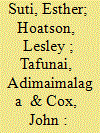

|
|
|
|
|
| Summary/Abstract |
This paper analyses the ‘Simbo for Change’ project in the Western Province of Solomon Islands, a collaboration between Simbo leaders and a Samoan non-governmental organisation (NGO), with funding provided by the Australian aid programme. We explore the role of local leadership in catalysing an island-wide community development project that has generated new livelihoods opportunities and led to greater community cohesion and more proactive governance. By mobilising around a ‘collective subject’ (Simbo as an island community), the project allowed existing skills and practices to be revalued and extended, particularly in relation to chiefly governance and the standing of women in the community. While mobilising the island scale was important in building social cohesion and support for livelihoods activities, this was not a parochial identity but was redefined by stronger connections to off-island markets, organic accreditation for Simbo, renewed interest from provincial and national government authorities and by the enduring trans-Pacific friendships established with the Samoan NGO and its trainers. The case study provides an example of the constructive potential of the island scale in Melanesia, whereas other recent studies of similar scale-making processes have focused on violent conflict generated by industrial scale mining.
|
|
|
|
|
|
|
|
|
|
|
|
|
|
|
|
| 15 |
ID:
161586
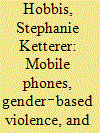

|
|
|
|
|
| Summary/Abstract |
This paper examines the potential benefits and pitfalls of mobile phones for accessing social services, particularly in response to gender‐based violence, in Solomon Islands and Papua New Guinea. Drawing on 13 months of ethnographic field research, I show how mobile phones increase rather than decrease perceived distances between social service providers and those they intend to serve. Mobile phones exaggerate the visibility of the shortcomings of the Solomon Islands and Papua New Guinea states and solidify an already entrenched distrust in the state and state services. This distrust is accentuated in experiences with mobile phone‐based mediations of gender‐based violence. Despite the positive influences of mobile phones, they are also recognised as conduits of violence. As such, mobile phones are not only morally ambivalent technologies but also, at times, actively disliked and their use discouraged. This challenges the optimism that surrounds many information and communication technologies for development (ICT4D) projects. When assessing the potentials, successes, and failures of ICT4D programmes, there is a need to pay more attention to the consequences of ‘negative’ or ‘unreliable’ usages of mobile phones as relational technologies.
|
|
|
|
|
|
|
|
|
|
|
|
|
|
|
|
| 16 |
ID:
103958
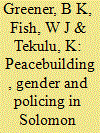

|
|
|
|
|
| Publication |
2011.
|
| Summary/Abstract |
UN Security Council Resolution 1325 calls for a gender perspective to be integrated into the resolution of conflicts. This responsibility manifests itself in a number of more specific proposals, some easily assessable, others less so. In this paper, we begin by considering the success of the Regional Assistance Mission to Solomon Islands (RAMSI) - the poster child for peacebuilding efforts - at meeting these specific proposals. In light of this, we then go on to suggest ways in which RAMSI might meet greater success in fully integrating gender considerations in Solomon Islands by blending sensitivity to gender-based considerations together with a deeper sensitivity to cultural considerations, including cultural understandings of core notions such as 'policing' and 'justice'.
|
|
|
|
|
|
|
|
|
|
|
|
|
|
|
|
| 17 |
ID:
069896


|
|
|
|
|
| Publication |
2005.
|
| Summary/Abstract |
Increasingly, significant numbers of personnel are deployed in field missions either to serve as police officers or to assist in reforming national police capacity. Reforming and building a police system - in this article termed 'policebuilding' - is exceedingly difficult, demanding the condensing of diverse training skills in a very short period and fast-forwarding the development of skills that are ideally built up over generations. This article examines the Australian initiative of 2004 that broke with the makeshift pattern of international police reform by forming an International Police Deployment Group (IDG). It assesses the deployment to the Solomon Islands in order to draw out lessons for future instances in which IDG officers may be called upon. The IDG appears to offer an apt structure, depth of planning, continuity of staffing and steadiness of resourcing that past missions have lacked. Yet, while relative calm and basic levels of law and order have been restored to the Solomon Islands, transferring authority and successfully supporting local police reform has proven to be more difficult.
|
|
|
|
|
|
|
|
|
|
|
|
|
|
|
|
| 18 |
ID:
075017


|
|
|
|
|
| Publication |
2006.
|
| Summary/Abstract |
Australia is engaged in a range of police-building exercises with its regional neighbours. The character of this assistance has changed across time and space reflecting, among other things, the development of new approaches to police-building in weak and post-conflict states. This article examines three such approaches adopted in Papua New Guinea and Solomon Islands, respectively. Both countries comprise challenging development contexts marked by high levels of social diversity and topographical fragmentation, weak centralised states, resilient and largely self-regulating village-based societies, and police forces with limited reach, resources, and popular legitimacy. Among other things, the review of Australian police-building experience in the Pacific Islands indicates the need to engage more effectively with non-state actors and organizations in building appropriate and sustainable policing systems in such fragile national environments.
|
|
|
|
|
|
|
|
|
|
|
|
|
|
|
|
| 19 |
ID:
143921
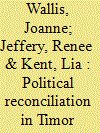

|
|
|
|
|
| Summary/Abstract |
In recent years, the study and practice of political reconciliation has experienced a turn to hybridity. This turn has been defined by the increased rate at which liberal international and local peacebuilding practices, and their underlying ideas, have become merged, integrated or co-located in time and space. While hybrid approaches to reconciliation have been praised as an effective means of engaging local populations in peacebuilding operations, little attention has been paid to examining whether or not they also bring unintended negative consequences. Drawing on the cases of Timor Leste, Solomon Islands and Bougainville, this article examines the potentially dark side of hybridity. It demonstrates that, in each of these cases, hybrid approaches to political reconciliation have brought both positive and negative consequences. On the positive side of the equation, hybridity has seen imported international approaches to reconciliation adapted to meet local demands and ensure resonance with local populations. On the negative side, however, the misappropriation and instrumentalisation of local practices within hybrid approaches has served to damage their legitimacy and to jeopardise their contributions to reconciliation. The article thus concludes that the existence and extent of this dark side necessitates a re-evaluation of how hybrid approaches to political reconciliation are planned and implemented.
|
|
|
|
|
|
|
|
|
|
|
|
|
|
|
|
| 20 |
ID:
079666


|
|
|
|
|
| Publication |
2007.
|
| Summary/Abstract |
The principal argument advanced in this paper is that spatial planning in the Solomon Islands has failed to deliver any substantive benefits and is therefore in urgent need of reform. The present model of planning, derived from a combination of colonial practice and legislation originating in the UK, does not add much, if any, value to the development process. The poor quality of planning in the Solomons cannot be seen in isolation. There are similar systems in use throughout much of the Commonwealth and anecdotal evidence suggests that the failings are widely duplicated. The Solomon Islands only appear exceptional in the extent to which other government systems have demonstrably broken down, following the 'Ethnic Tension' of 2000 - 03. The Regional Assistance Mission to the Solomon Islands (RAMSI) provides a unique opportunity for a review of the way in which planning operates. A number of issues are identified which any reformed system must address
|
|
|
|
|
|
|
|
|
|
|
|
|
|
|
|
|
|
|
|
|